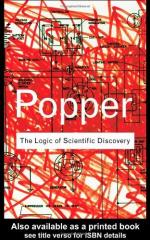|
This section contains 538 words (approx. 2 pages at 400 words per page) |

|
Part I: Chapter 1, A Survey of Some Fundamental Problems Summary and Analysis
The Logic of Scientific Discovery by Karl Popper is an analysis of scientific thinking through the particular view of epistemology held by this well-known philosopher of science. In this first chapter he analyzes the methods of empirical science. He claims that metaphysical and philosophical ideas contribute heavily to the cosmology in empirical scientific endeavors. He believes there is far more to such endeavors than the language analyst's "linguistic puzzles" or other investigations about how scientific laws are arrived at and accepted. Equating rational attitude with critical thinking, Popper draws a clear line between two approaches to knowledge, common sense and scientific thinking.
The problem of epistemology lies in whether problems are logically approached inductively or deductively. Popper overtly dismisses inductive methods by denying the existence...
(read more from the Part I: Chapter 1, A Survey of Some Fundamental Problems Summary)
|
This section contains 538 words (approx. 2 pages at 400 words per page) |

|




